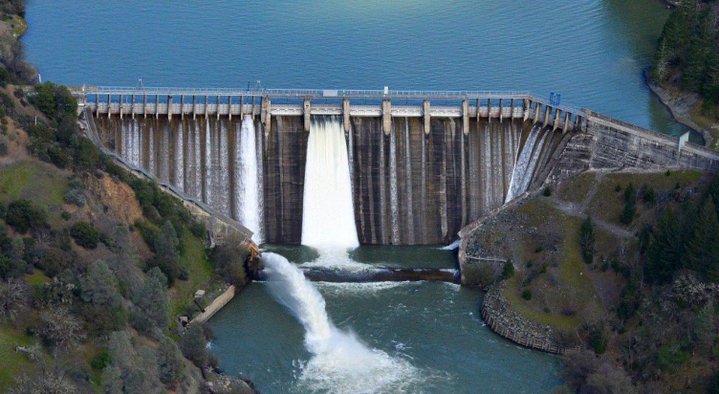
Scott Dam at Lake Pillsbury — a key component of the Potter Valley Project. Photo: PG&E.
Pacific Gas and Electric is actively considering the possibility of getting out of the business of operating dams on the Eel River, a company representative told a regional commission this morning.
The company’s decision, when it comes, could ignite a northern California water war.
The two dams associated with the utility’s Potter Valley Project — a hydropower system — annually divert tens of thousands of acre-feet of water out of the Eel River and into the Russian River watershed, where it is used by municipalities and agricultural operations in Lake, Mendocino and Sonoma counties.
At a meeting of the Eel Russian River Commission in Eureka this morning, PG&E director of power generation David Moller said that the utility has been looking at all its options as in undergoes the process of relicensing the dams. The current licenses for the project — issued by the Federal Energy Regulatory Commission — are set to expire in 2022.
“While we’ve been working on this relicensing project, we’ve also been looking at whether the project is a good fit,” Moller said. He later added that the amount of power generated by the project is a minuscule portion of its overall portfolio, and comes at a time when PG&E is experiencing less demand for energy.
The announcement at the Eel Russian River Commission — a regional body with representatives from Humboldt, Mendocino, Lake and Sonoma county government on its board — marks the first time that PG&E has stated publicly that it might seek to divest itself of the project.
Moller said that though the company is continuing to move forward with the effort to relicense the dams, it is, at the same time, deciding between three broad options for the future of the project — to hold onto the project, to sell it to someone or something else, or to simply abandon it.
He said that PG&E will likely make a final decision over which course to pursue in the next couple of months.
But the public interest in the decision, when it comes, will almost certainly have almost nothing to do with the actual power generated by the project; rather, it will be in the project’s side effect — the large amount of water diverted from the Eel and into the Russian, where it has fueled the growth of Sonoma County sprawl and its wine industry.
At this morning’s meeting, Stephanie Tidwell of Friends of the Eel — a local nonprofit that has advocated for the decommissioning and removal of the dams — warned whoever might be thinking of operating the Potter Valley project in the future that locals would oppose any proposal to continue water diversions to the Russian.
“Humboldt County gets nothing from these dams except more dead fish,” Tidwell said.
Scott Greacen, Tidwell’s colleague at Friends of the Eel, told the commission that no one, apart from one Potter Valley irrigation district, actually owns legal rights to the water that PG&E diverts from the Eel — that the vast majority of it is considered legally “abandoned” after it leaves the utility’s turbines.
But Guinness McFadden, a Potter Valley farmer who sits of the board of directors of the town’s irrigation district, urged the Humboldt-centric crowd to keep residents of the Russian River in their thoughts, moving forward.
“Let’s not forget the 600,000 people downstream of the Potter Valley project who depend on this water,” he said.
CLICK TO MANAGE